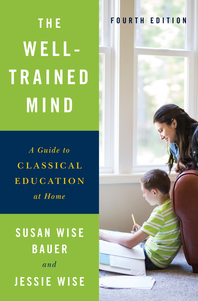The Well-Trained Mind: A Guide to Classical Education at Home is one of the most useful books for homeschooling parents, even if they do not use a classical approach to education. The fourth edition features more than 800 pages chock full of practical advice and resource recommendations from Susan Wise Bauer and her mother, Jessie Wise.
The book begins with a chapter from each of the authors about their personal experience and some thoughts on classical education. While the book primarily addresses those who choose to home educate their children, it also serves those who want to provide after-school supplementation for their children.
The book is divided into four parts. The first three address the three stages of the Trivium: the grammar stage, the logic or dialectic stage, and the rhetoric stage. The fourth section is titled, "Coming Home: How to Educate Your Child at Home."
According to this interpretation of the Trivium, the stages of the Trivium correspond to the normal cognitive development of a child. The grammar stage is for the acquisition of information and skills, often through memorization. This is generally up through about the fourth-grade. In the logic stage, children begin to ask questions, compare and contrast information, make logical connections between bits of information, and learn to formulate arguments. Grades five through eight are the normal time period for the logic stage. At the high school level, students move on to the rhetoric stage where the emphasis is upon learning how to express oneself through speaking and writing. Obviously, each stage builds upon and incorporates earlier stages.
Within each of the Trivium sections, the authors first provide some background information on teaching children in that age range. Then they proceed through each area of learning (including foreign language, art, music, and technology) with specific instructions and resource recommendations. Since both Susan Wise Bauer and Jessie Wise have authored a number of resources in recent years, it is not surprising to see those resources recommended in the appropriate sections. In the fourth edition, resource lists for some sections have been expanded to include more reviews or comments on many products. Resource lists also have added some of the great new resources that have become available. For some sections, resource lists can be accessed on a supplemental website. The supplemental website is constantly being updated and expanded, so be sure to check it out.
Educational technology has improved significantly in recent years, and that is reflected in the new edition. The authors take a more favorable approach to the use of software and online learning since many of the newer resources now offer deep and meaningful learning experiences.
In Part III The Rhetoric Stage: Ninth Grade Through Twelfth Grade, the chapters covering each subject area now includes a section “How to Put It on the Transcript” that suggests ways to enter course information on a transcript that will make sense to colleges and universities.
The fourth section of the book is a homeschool primer covering why you should home school, taking your child out of school, the socialization question, planning, grading, record keeping, testing, sports/athletics, helpful resources such as online courses, applying for college, and apprenticeships.
The book concludes with an extensive and extremely helpful index.
The authors maintain a purposely non-sectarian tone through most of the book although a few of the recommended resources such as Susan Wise Bauer's own Story of the World Volume 2 and the Rod and Staff English series have a Protestant perspective. Most books recommended are secular, and the authors rarely include mention of worldview or religious perspectives in their brief resource descriptions.
Within recommended resources for science, this might be more of an issue for some Christian parents. Missing are any resources promoting a creationist viewpoint, most notably Jay Wile’s Science in History series that would seem to be a perfect fit for those using a classical approach. On the contrary, recommended reading for the rhetoric level under biology supports an evolutionary point of view as does the top recommendation for a biology textbook, the controversial Biology course by Miller and Levine. Given the nature of classical education, I would expect to see more variety of viewpoints in recommended resources to help students evaluate different views on the origins debate.
Whatever your perspective, The Well-Trained Mind is inspiring to read and extremely helpful for homeschooling.
You might also find The Well-Trained Mind online forums a valuable resource.











